Fundamentals of Law: Contract Enforceability and Mistake Analysis-NWK
VerifiedAdded on 2023/04/23
|7
|1675
|299
Homework Assignment
AI Summary
This assignment delves into several key aspects of contract law, analyzing scenarios involving offer, acceptance, and the enforceability of agreements. Part A examines whether an enforceable contract exists between Ian and Ben, considering the postal rule and revocation of offers, ultimately concluding that a contract was formed and Ian would likely succeed in a breach of contract claim. It also addresses the defense of mistake in contract law, particularly mutual mistake, in the context of a scenario involving Ben and Sharon, determining that no mutual consent existed and the contract was not legally enforceable. Part B explores a scenario involving Gordon and Mary, focusing on the validity of a contract where Mary misrepresented herself, concluding that the contract between Mary and Gordon was valid, title passed to Mary, and subsequently to Cheng, giving Cheng a better title to the car. The analysis is supported by relevant case law such as Adams v Lindsell, Brinkibon Ltd v Stahag Stahl, Cundy v Lindsay, and Phillips v Brooks Ltd.
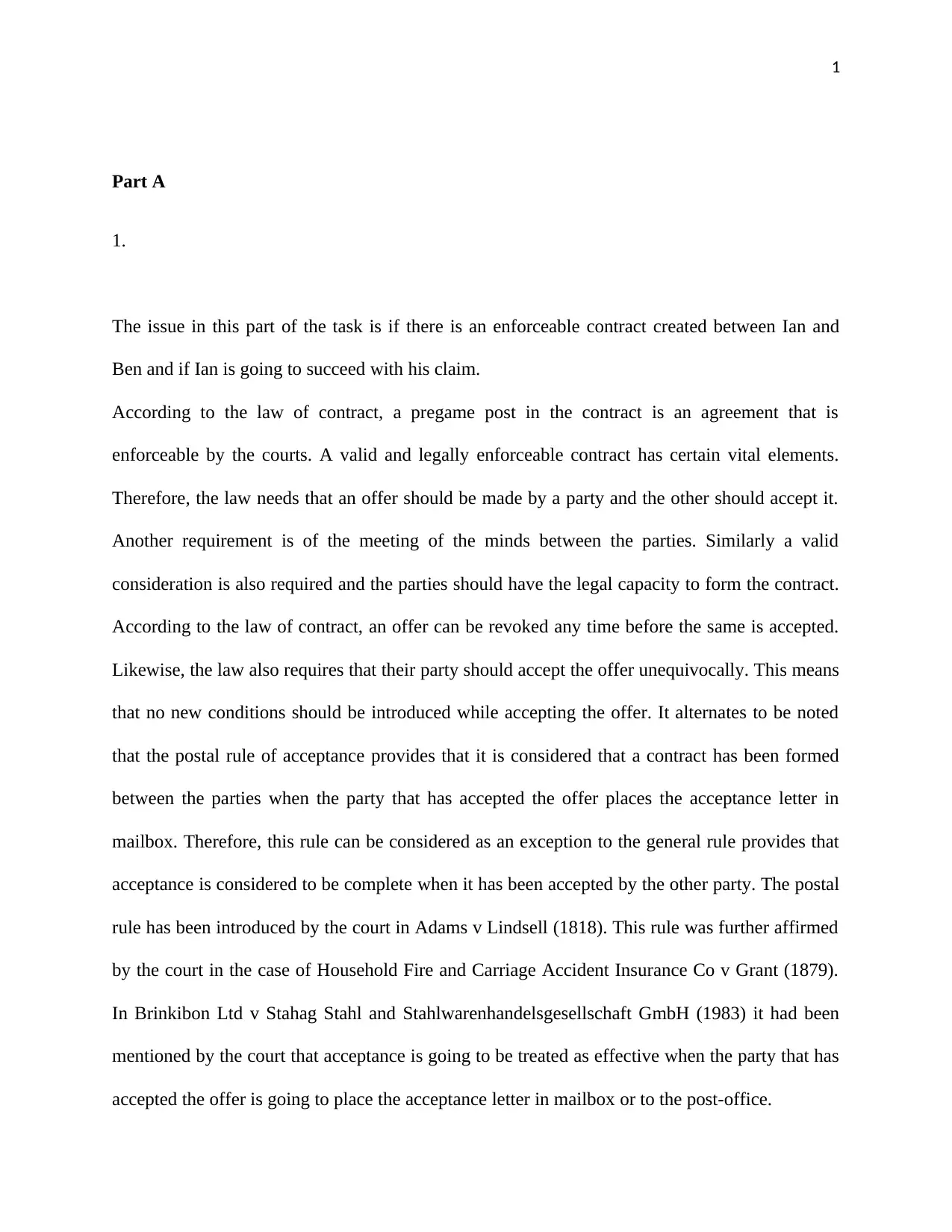
1
Part A
1.
The issue in this part of the task is if there is an enforceable contract created between Ian and
Ben and if Ian is going to succeed with his claim.
According to the law of contract, a pregame post in the contract is an agreement that is
enforceable by the courts. A valid and legally enforceable contract has certain vital elements.
Therefore, the law needs that an offer should be made by a party and the other should accept it.
Another requirement is of the meeting of the minds between the parties. Similarly a valid
consideration is also required and the parties should have the legal capacity to form the contract.
According to the law of contract, an offer can be revoked any time before the same is accepted.
Likewise, the law also requires that their party should accept the offer unequivocally. This means
that no new conditions should be introduced while accepting the offer. It alternates to be noted
that the postal rule of acceptance provides that it is considered that a contract has been formed
between the parties when the party that has accepted the offer places the acceptance letter in
mailbox. Therefore, this rule can be considered as an exception to the general rule provides that
acceptance is considered to be complete when it has been accepted by the other party. The postal
rule has been introduced by the court in Adams v Lindsell (1818). This rule was further affirmed
by the court in the case of Household Fire and Carriage Accident Insurance Co v Grant (1879).
In Brinkibon Ltd v Stahag Stahl and Stahlwarenhandelsgesellschaft GmbH (1983) it had been
mentioned by the court that acceptance is going to be treated as effective when the party that has
accepted the offer is going to place the acceptance letter in mailbox or to the post-office.
Part A
1.
The issue in this part of the task is if there is an enforceable contract created between Ian and
Ben and if Ian is going to succeed with his claim.
According to the law of contract, a pregame post in the contract is an agreement that is
enforceable by the courts. A valid and legally enforceable contract has certain vital elements.
Therefore, the law needs that an offer should be made by a party and the other should accept it.
Another requirement is of the meeting of the minds between the parties. Similarly a valid
consideration is also required and the parties should have the legal capacity to form the contract.
According to the law of contract, an offer can be revoked any time before the same is accepted.
Likewise, the law also requires that their party should accept the offer unequivocally. This means
that no new conditions should be introduced while accepting the offer. It alternates to be noted
that the postal rule of acceptance provides that it is considered that a contract has been formed
between the parties when the party that has accepted the offer places the acceptance letter in
mailbox. Therefore, this rule can be considered as an exception to the general rule provides that
acceptance is considered to be complete when it has been accepted by the other party. The postal
rule has been introduced by the court in Adams v Lindsell (1818). This rule was further affirmed
by the court in the case of Household Fire and Carriage Accident Insurance Co v Grant (1879).
In Brinkibon Ltd v Stahag Stahl and Stahlwarenhandelsgesellschaft GmbH (1983) it had been
mentioned by the court that acceptance is going to be treated as effective when the party that has
accepted the offer is going to place the acceptance letter in mailbox or to the post-office.
Paraphrase This Document
Need a fresh take? Get an instant paraphrase of this document with our AI Paraphraser
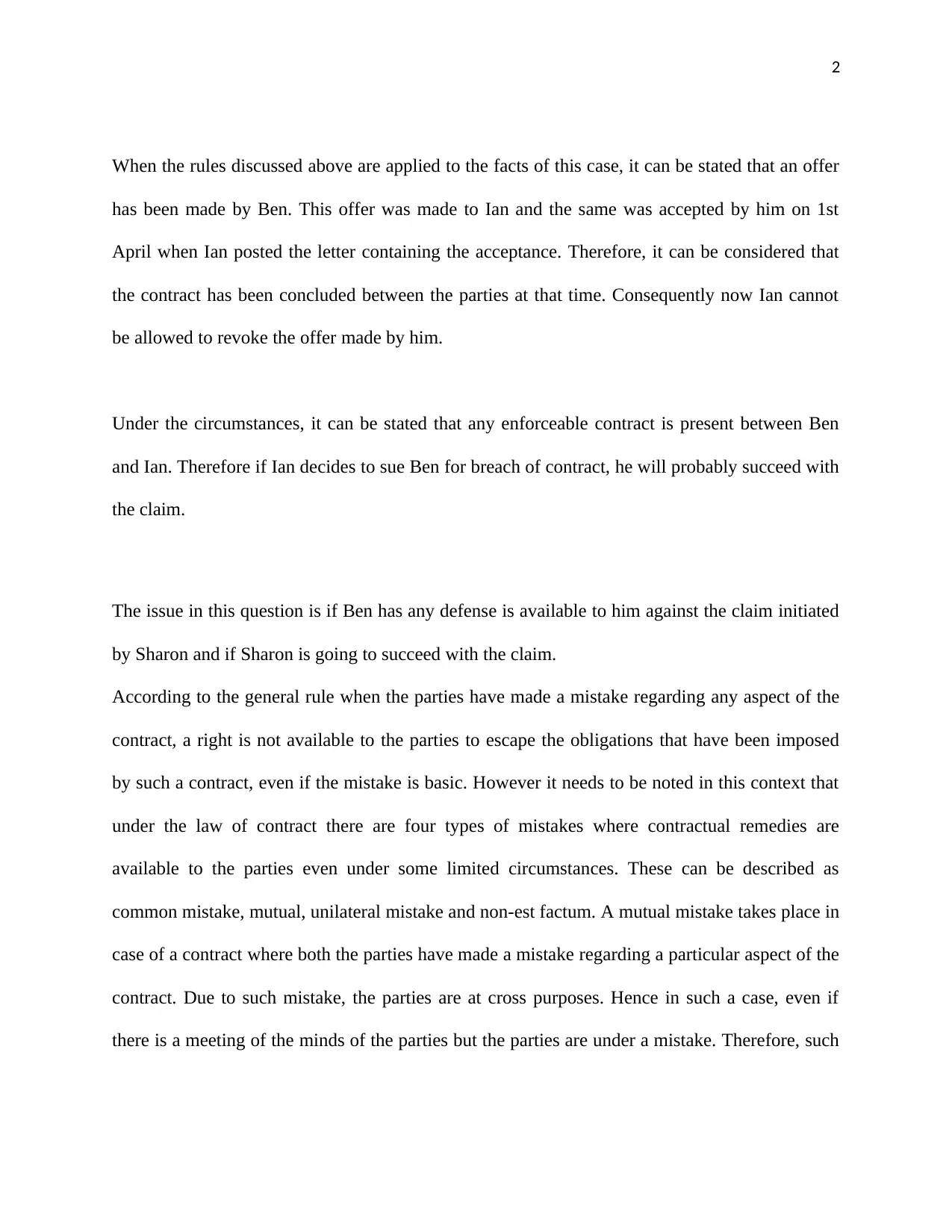
2
When the rules discussed above are applied to the facts of this case, it can be stated that an offer
has been made by Ben. This offer was made to Ian and the same was accepted by him on 1st
April when Ian posted the letter containing the acceptance. Therefore, it can be considered that
the contract has been concluded between the parties at that time. Consequently now Ian cannot
be allowed to revoke the offer made by him.
Under the circumstances, it can be stated that any enforceable contract is present between Ben
and Ian. Therefore if Ian decides to sue Ben for breach of contract, he will probably succeed with
the claim.
The issue in this question is if Ben has any defense is available to him against the claim initiated
by Sharon and if Sharon is going to succeed with the claim.
According to the general rule when the parties have made a mistake regarding any aspect of the
contract, a right is not available to the parties to escape the obligations that have been imposed
by such a contract, even if the mistake is basic. However it needs to be noted in this context that
under the law of contract there are four types of mistakes where contractual remedies are
available to the parties even under some limited circumstances. These can be described as
common mistake, mutual, unilateral mistake and non-est factum. A mutual mistake takes place in
case of a contract where both the parties have made a mistake regarding a particular aspect of the
contract. Due to such mistake, the parties are at cross purposes. Hence in such a case, even if
there is a meeting of the minds of the parties but the parties are under a mistake. Therefore, such
When the rules discussed above are applied to the facts of this case, it can be stated that an offer
has been made by Ben. This offer was made to Ian and the same was accepted by him on 1st
April when Ian posted the letter containing the acceptance. Therefore, it can be considered that
the contract has been concluded between the parties at that time. Consequently now Ian cannot
be allowed to revoke the offer made by him.
Under the circumstances, it can be stated that any enforceable contract is present between Ben
and Ian. Therefore if Ian decides to sue Ben for breach of contract, he will probably succeed with
the claim.
The issue in this question is if Ben has any defense is available to him against the claim initiated
by Sharon and if Sharon is going to succeed with the claim.
According to the general rule when the parties have made a mistake regarding any aspect of the
contract, a right is not available to the parties to escape the obligations that have been imposed
by such a contract, even if the mistake is basic. However it needs to be noted in this context that
under the law of contract there are four types of mistakes where contractual remedies are
available to the parties even under some limited circumstances. These can be described as
common mistake, mutual, unilateral mistake and non-est factum. A mutual mistake takes place in
case of a contract where both the parties have made a mistake regarding a particular aspect of the
contract. Due to such mistake, the parties are at cross purposes. Hence in such a case, even if
there is a meeting of the minds of the parties but the parties are under a mistake. Therefore, such
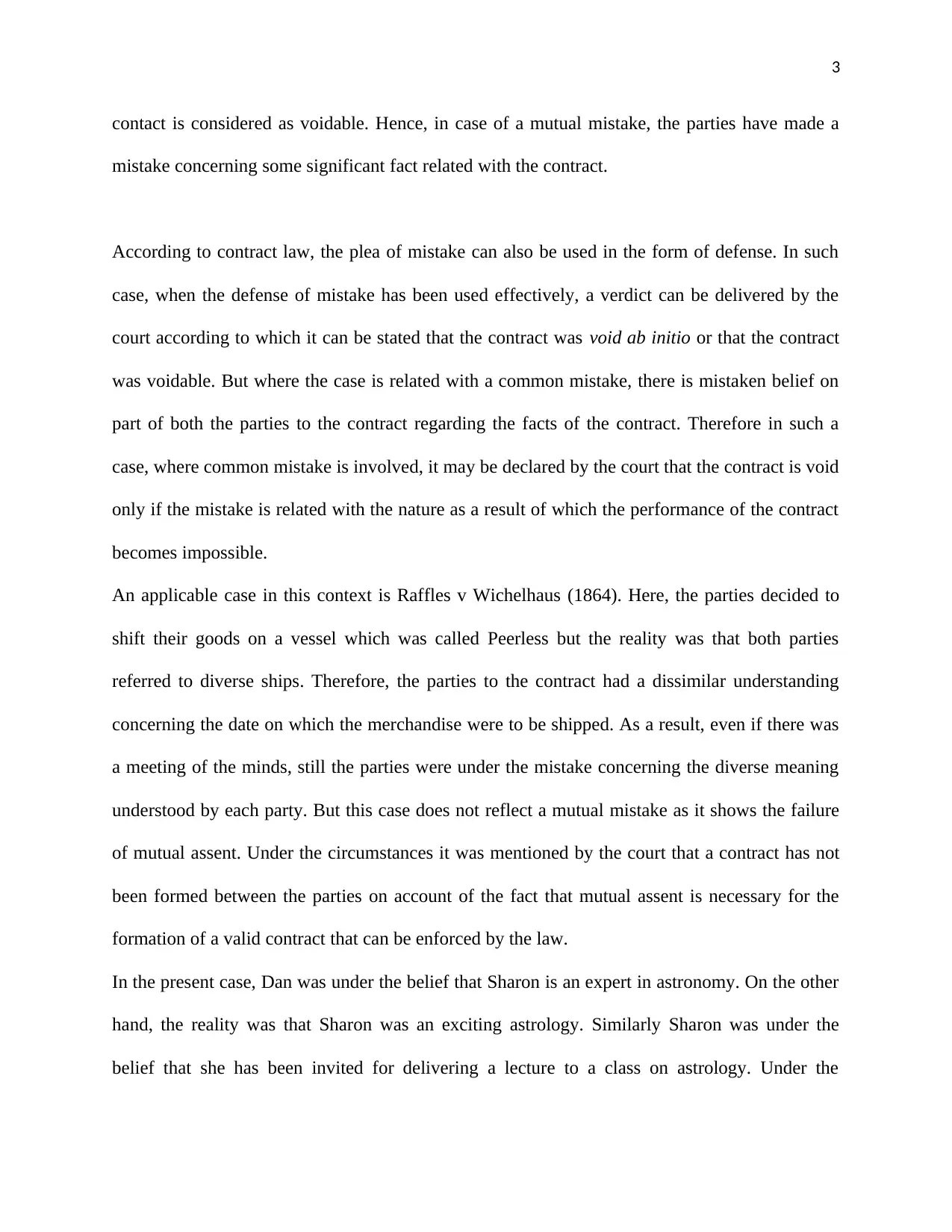
3
contact is considered as voidable. Hence, in case of a mutual mistake, the parties have made a
mistake concerning some significant fact related with the contract.
According to contract law, the plea of mistake can also be used in the form of defense. In such
case, when the defense of mistake has been used effectively, a verdict can be delivered by the
court according to which it can be stated that the contract was void ab initio or that the contract
was voidable. But where the case is related with a common mistake, there is mistaken belief on
part of both the parties to the contract regarding the facts of the contract. Therefore in such a
case, where common mistake is involved, it may be declared by the court that the contract is void
only if the mistake is related with the nature as a result of which the performance of the contract
becomes impossible.
An applicable case in this context is Raffles v Wichelhaus (1864). Here, the parties decided to
shift their goods on a vessel which was called Peerless but the reality was that both parties
referred to diverse ships. Therefore, the parties to the contract had a dissimilar understanding
concerning the date on which the merchandise were to be shipped. As a result, even if there was
a meeting of the minds, still the parties were under the mistake concerning the diverse meaning
understood by each party. But this case does not reflect a mutual mistake as it shows the failure
of mutual assent. Under the circumstances it was mentioned by the court that a contract has not
been formed between the parties on account of the fact that mutual assent is necessary for the
formation of a valid contract that can be enforced by the law.
In the present case, Dan was under the belief that Sharon is an expert in astronomy. On the other
hand, the reality was that Sharon was an exciting astrology. Similarly Sharon was under the
belief that she has been invited for delivering a lecture to a class on astrology. Under the
contact is considered as voidable. Hence, in case of a mutual mistake, the parties have made a
mistake concerning some significant fact related with the contract.
According to contract law, the plea of mistake can also be used in the form of defense. In such
case, when the defense of mistake has been used effectively, a verdict can be delivered by the
court according to which it can be stated that the contract was void ab initio or that the contract
was voidable. But where the case is related with a common mistake, there is mistaken belief on
part of both the parties to the contract regarding the facts of the contract. Therefore in such a
case, where common mistake is involved, it may be declared by the court that the contract is void
only if the mistake is related with the nature as a result of which the performance of the contract
becomes impossible.
An applicable case in this context is Raffles v Wichelhaus (1864). Here, the parties decided to
shift their goods on a vessel which was called Peerless but the reality was that both parties
referred to diverse ships. Therefore, the parties to the contract had a dissimilar understanding
concerning the date on which the merchandise were to be shipped. As a result, even if there was
a meeting of the minds, still the parties were under the mistake concerning the diverse meaning
understood by each party. But this case does not reflect a mutual mistake as it shows the failure
of mutual assent. Under the circumstances it was mentioned by the court that a contract has not
been formed between the parties on account of the fact that mutual assent is necessary for the
formation of a valid contract that can be enforced by the law.
In the present case, Dan was under the belief that Sharon is an expert in astronomy. On the other
hand, the reality was that Sharon was an exciting astrology. Similarly Sharon was under the
belief that she has been invited for delivering a lecture to a class on astrology. Under the
⊘ This is a preview!⊘
Do you want full access?
Subscribe today to unlock all pages.

Trusted by 1+ million students worldwide
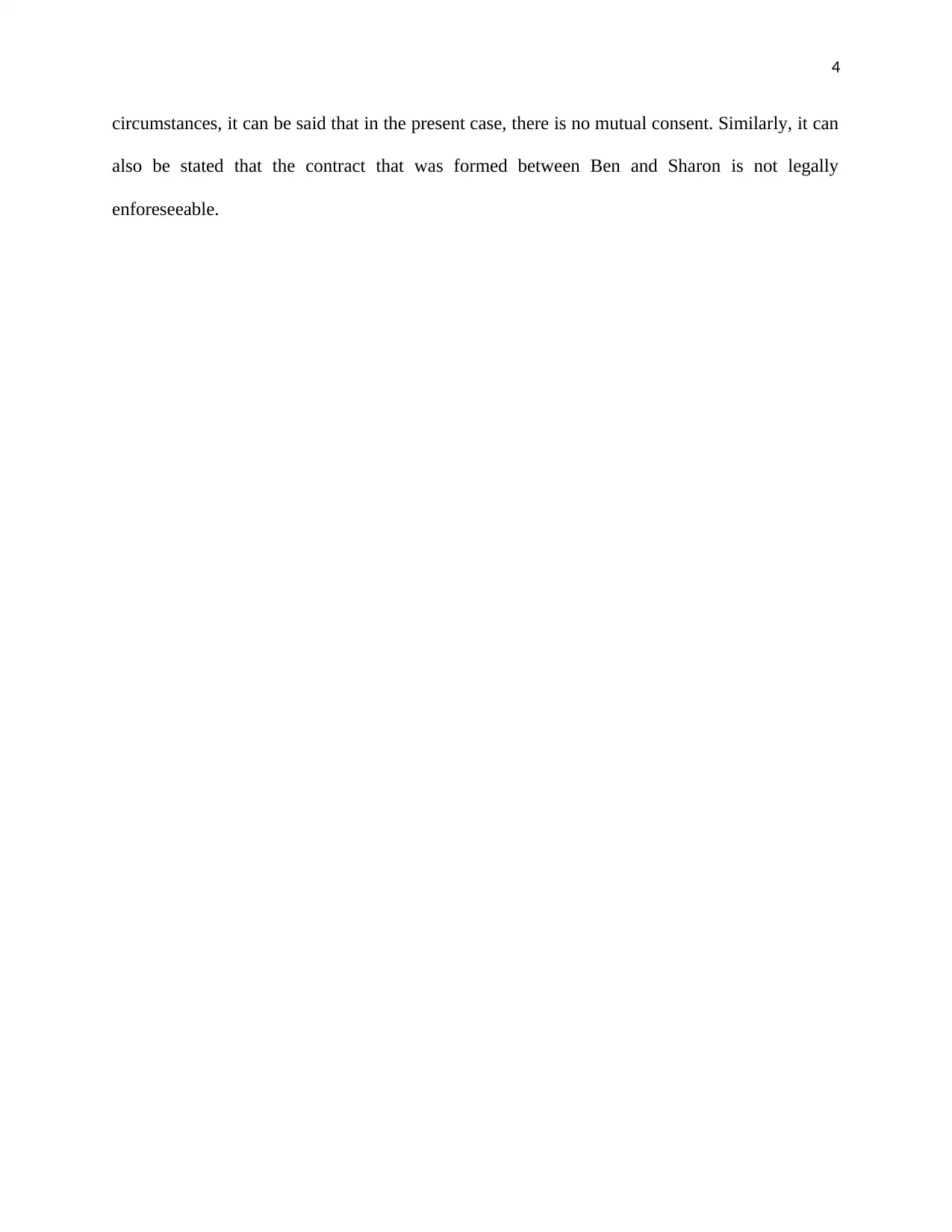
4
circumstances, it can be said that in the present case, there is no mutual consent. Similarly, it can
also be stated that the contract that was formed between Ben and Sharon is not legally
enforeseeable.
circumstances, it can be said that in the present case, there is no mutual consent. Similarly, it can
also be stated that the contract that was formed between Ben and Sharon is not legally
enforeseeable.
Paraphrase This Document
Need a fresh take? Get an instant paraphrase of this document with our AI Paraphraser
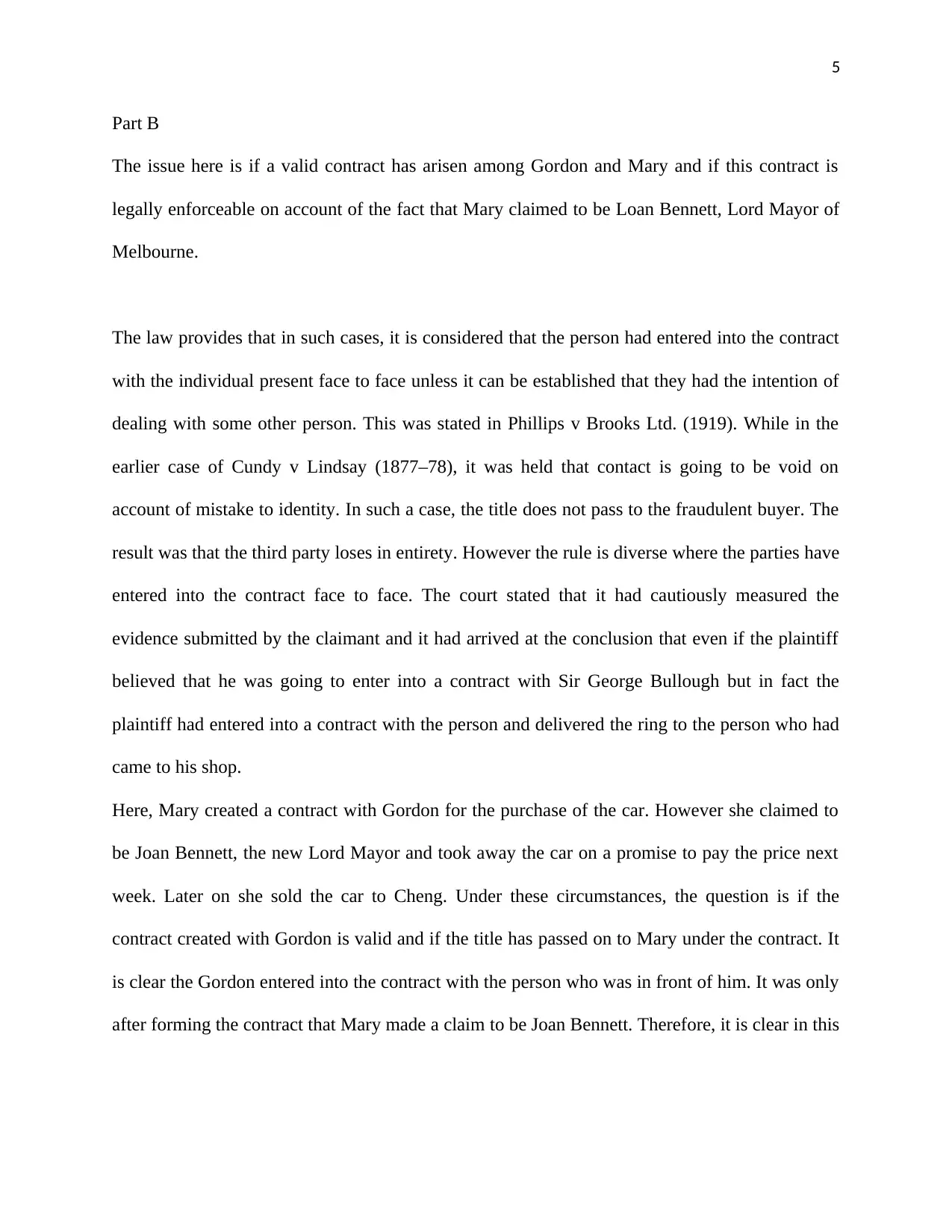
5
Part B
The issue here is if a valid contract has arisen among Gordon and Mary and if this contract is
legally enforceable on account of the fact that Mary claimed to be Loan Bennett, Lord Mayor of
Melbourne.
The law provides that in such cases, it is considered that the person had entered into the contract
with the individual present face to face unless it can be established that they had the intention of
dealing with some other person. This was stated in Phillips v Brooks Ltd. (1919). While in the
earlier case of Cundy v Lindsay (1877–78), it was held that contact is going to be void on
account of mistake to identity. In such a case, the title does not pass to the fraudulent buyer. The
result was that the third party loses in entirety. However the rule is diverse where the parties have
entered into the contract face to face. The court stated that it had cautiously measured the
evidence submitted by the claimant and it had arrived at the conclusion that even if the plaintiff
believed that he was going to enter into a contract with Sir George Bullough but in fact the
plaintiff had entered into a contract with the person and delivered the ring to the person who had
came to his shop.
Here, Mary created a contract with Gordon for the purchase of the car. However she claimed to
be Joan Bennett, the new Lord Mayor and took away the car on a promise to pay the price next
week. Later on she sold the car to Cheng. Under these circumstances, the question is if the
contract created with Gordon is valid and if the title has passed on to Mary under the contract. It
is clear the Gordon entered into the contract with the person who was in front of him. It was only
after forming the contract that Mary made a claim to be Joan Bennett. Therefore, it is clear in this
Part B
The issue here is if a valid contract has arisen among Gordon and Mary and if this contract is
legally enforceable on account of the fact that Mary claimed to be Loan Bennett, Lord Mayor of
Melbourne.
The law provides that in such cases, it is considered that the person had entered into the contract
with the individual present face to face unless it can be established that they had the intention of
dealing with some other person. This was stated in Phillips v Brooks Ltd. (1919). While in the
earlier case of Cundy v Lindsay (1877–78), it was held that contact is going to be void on
account of mistake to identity. In such a case, the title does not pass to the fraudulent buyer. The
result was that the third party loses in entirety. However the rule is diverse where the parties have
entered into the contract face to face. The court stated that it had cautiously measured the
evidence submitted by the claimant and it had arrived at the conclusion that even if the plaintiff
believed that he was going to enter into a contract with Sir George Bullough but in fact the
plaintiff had entered into a contract with the person and delivered the ring to the person who had
came to his shop.
Here, Mary created a contract with Gordon for the purchase of the car. However she claimed to
be Joan Bennett, the new Lord Mayor and took away the car on a promise to pay the price next
week. Later on she sold the car to Cheng. Under these circumstances, the question is if the
contract created with Gordon is valid and if the title has passed on to Mary under the contract. It
is clear the Gordon entered into the contract with the person who was in front of him. It was only
after forming the contract that Mary made a claim to be Joan Bennett. Therefore, it is clear in this
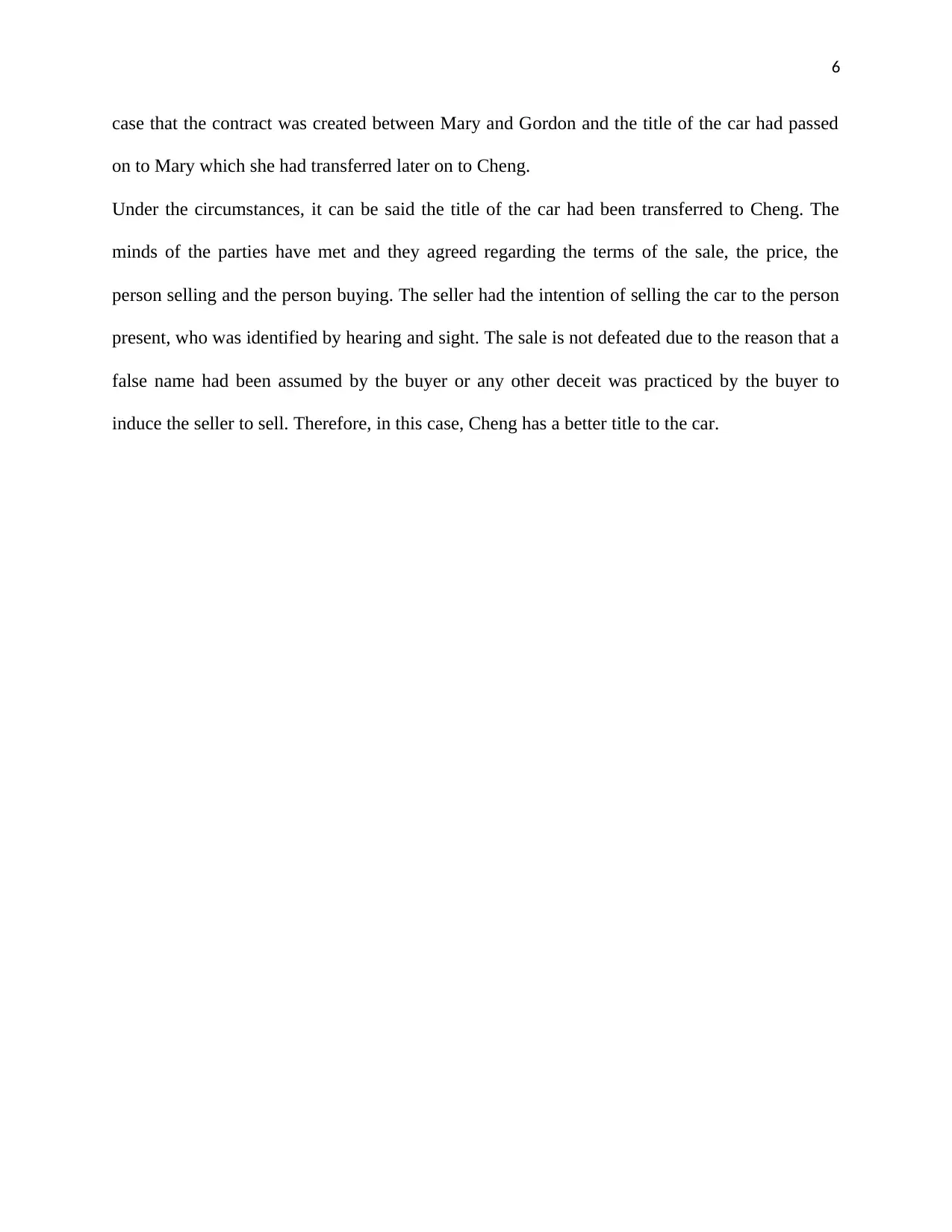
6
case that the contract was created between Mary and Gordon and the title of the car had passed
on to Mary which she had transferred later on to Cheng.
Under the circumstances, it can be said the title of the car had been transferred to Cheng. The
minds of the parties have met and they agreed regarding the terms of the sale, the price, the
person selling and the person buying. The seller had the intention of selling the car to the person
present, who was identified by hearing and sight. The sale is not defeated due to the reason that a
false name had been assumed by the buyer or any other deceit was practiced by the buyer to
induce the seller to sell. Therefore, in this case, Cheng has a better title to the car.
case that the contract was created between Mary and Gordon and the title of the car had passed
on to Mary which she had transferred later on to Cheng.
Under the circumstances, it can be said the title of the car had been transferred to Cheng. The
minds of the parties have met and they agreed regarding the terms of the sale, the price, the
person selling and the person buying. The seller had the intention of selling the car to the person
present, who was identified by hearing and sight. The sale is not defeated due to the reason that a
false name had been assumed by the buyer or any other deceit was practiced by the buyer to
induce the seller to sell. Therefore, in this case, Cheng has a better title to the car.
⊘ This is a preview!⊘
Do you want full access?
Subscribe today to unlock all pages.

Trusted by 1+ million students worldwide
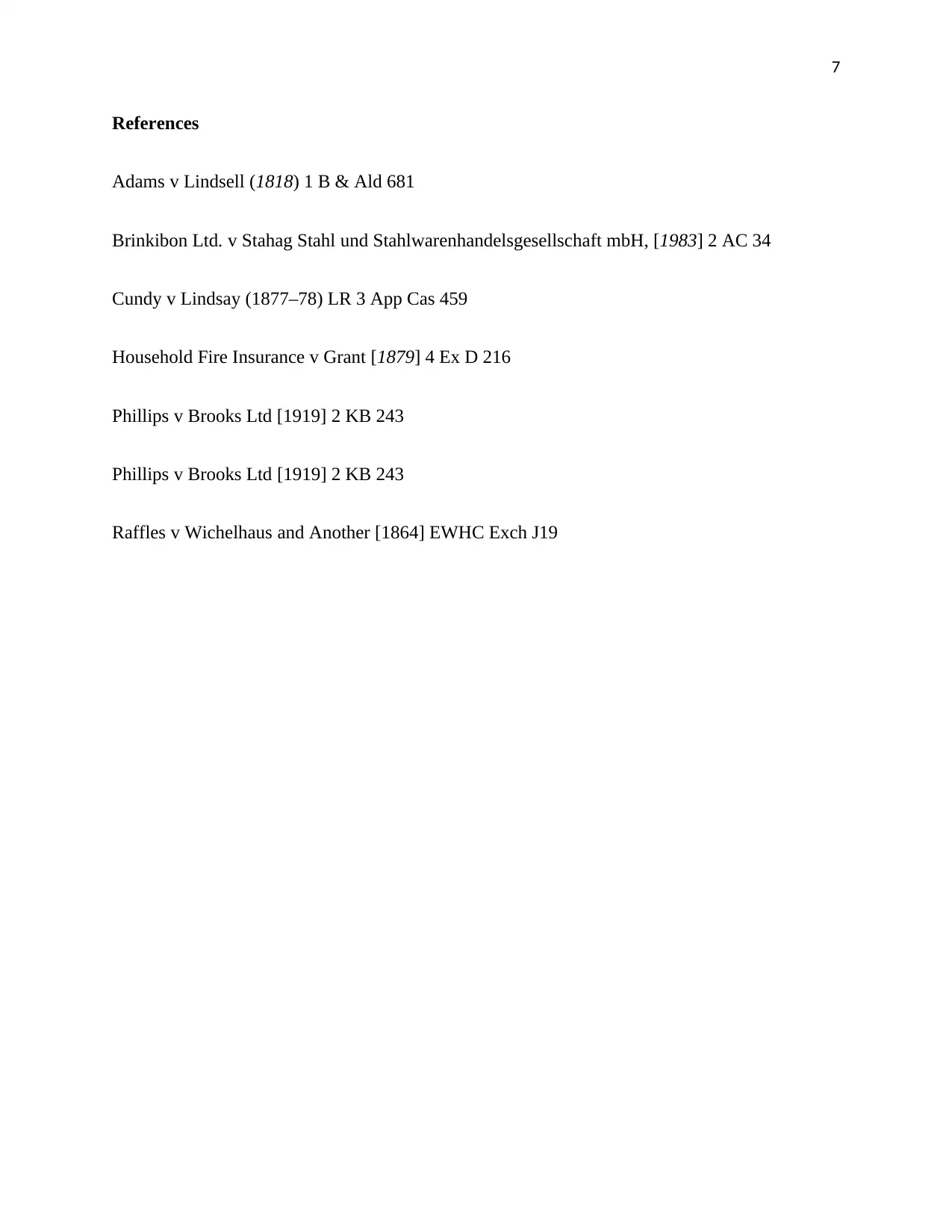
7
References
Adams v Lindsell (1818) 1 B & Ald 681
Brinkibon Ltd. v Stahag Stahl und Stahlwarenhandelsgesellschaft mbH, [1983] 2 AC 34
Cundy v Lindsay (1877–78) LR 3 App Cas 459
Household Fire Insurance v Grant [1879] 4 Ex D 216
Phillips v Brooks Ltd [1919] 2 KB 243
Phillips v Brooks Ltd [1919] 2 KB 243
Raffles v Wichelhaus and Another [1864] EWHC Exch J19
References
Adams v Lindsell (1818) 1 B & Ald 681
Brinkibon Ltd. v Stahag Stahl und Stahlwarenhandelsgesellschaft mbH, [1983] 2 AC 34
Cundy v Lindsay (1877–78) LR 3 App Cas 459
Household Fire Insurance v Grant [1879] 4 Ex D 216
Phillips v Brooks Ltd [1919] 2 KB 243
Phillips v Brooks Ltd [1919] 2 KB 243
Raffles v Wichelhaus and Another [1864] EWHC Exch J19
1 out of 7
Related Documents
Your All-in-One AI-Powered Toolkit for Academic Success.
+13062052269
info@desklib.com
Available 24*7 on WhatsApp / Email
![[object Object]](/_next/static/media/star-bottom.7253800d.svg)
Unlock your academic potential
Copyright © 2020–2026 A2Z Services. All Rights Reserved. Developed and managed by ZUCOL.





